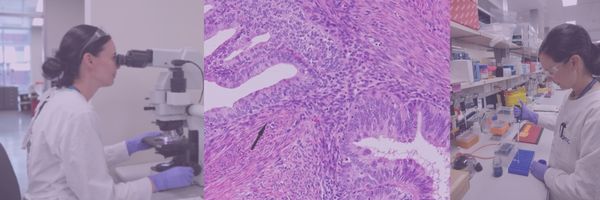feMMe Molecular Project
The current standard treatment for women with endometrial cancer includes a total hysterectomy. While highly effective, there are side effects involved for:
- women with severe medical co-morbidities and/or morbid obesity who are at risk for surgical complications and for whom surgery is unsafe.
- young women who still wish to have children.
For these women, we need treatment options that are equally effective but less invasive.
The clinical trial team looked at treating women with endometrial cancer less-invasively using the Mirena, an intra-uterine device (IUD). This is the same device that is commonly used as a contraceptive. Levonorgestrel delivered through an intrauterine device (LNG-IUD) is a novel substitute treatment to replace hysterectomy. In our feMMe clinical trial, this approach was well tolerated, and in 50 per cent of patients there was no remaining endometrial cancer found at six months.
Unfortunately, we cannot predict yet who will benefit from this treatment.
If we can determine who will respond, clinicians could specifically offer this treatment to women who will likely benefit. feMMe Molecular will take this one step further with researchers using the blood and tissue samples collected as part of the feMMe trial, to identify predictive biomarkers of LNG-IUD response that indicate whether a patient will or will not benefit from this new treatment. Using these findings, they will develop a personalised decision tool that clinicians and patients can use to decide on the best treatment.
Publications / Resources
Improving treatment for obese women with early stage cancer of the uterus: Rationale and design of the levonorgestrel intrauterine device ± Metformin ± weight loss in endometrial cancer (feMME) trial (2014). https://doi.org/10.1016/j.cct.2014.06.014
Improving response to progestin treatment of low-grade endometrial cancer (2020). https://doi.org/10.1136/ijgc-2020-001309
Fertility-sparing management of early-stage endometrial cancer in reproductive age women: current treatment outcomes and future directions (2021). https://doi.org/10.1136/ijgc-2021-003192
Complete pathological response following levonorgestrel intrauterine device in clinically stage 1 endometrial adenocarcinoma: Results of a randomized clinical trial (2021). https://doi.org/10.1016/j.ygyno.2021.01.029
Patient experiences of conservative treatment for early stage endometrial cancer and endometrial hyperplasia with atypia using levonorgestrel intrauterine device: A qualitative study (2022). https://doi.org/10.1016/j.gore.2021.100914
Central pathology review of endometrial hyperplasia and adenocarcinoma before and after treatment with the levonorgestrel intrauterine device–results from the feMMe phase 2 randomized clinical trial (2025). https://doi.org/10.1097/pas.0000000000002492
Diet and lifestyle quality in Australian women with endometrial cancer at diagnosis - insights from the FeMMe trial (2025). https://doi.org/10.1016/j.cdnut.2025.107572
Contact Us
For further information please contact the feMMe research team at e.baxter@uq.edu.au.

